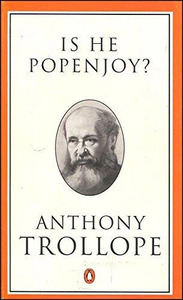
We all know Trollope was no feminist, but Is He Popenjoy? (1878) is the only novel in which he openly attacks the nascent women’s rights movement. He revels in imaginary meetings in Marylebone, organised by the Rights of Women Institute for the Relief of the Disabilities of Females (known more succinctly and disparagingly as ‘Disabilities’). Presiding over this august group are the unsubtly-named Lady Selina Protest, Baroness Bannman, who has a “considerable moustache”, Dr Olivia Q. Fleabody, and Ju Mildmay. Mildmay is aunt to Lord George Germain, whose unhappy young wife Mary attends the meetings, prompted by curiosity and dissatisfaction. There she sees:
strongly-visaged spinsters and mutinous wives, who twice a week were worked up by Dr Fleabody to a full belief that a glorious era was at hand in which women would be chosen by constituencies, would wag their heads in courts of law, would buy and sell in Capel Court, and have balances at their bankers.
The narrator tells us that Dr Fleabody “made proselytes by the hundred, and disturbed the happiness of many fathers of families.” Fleabody is described as an “enthusiastic hybrid,” and this grotesque caricature reaches Dickensian heights of distortion. According to Victoria Glendinning,1 she is based on real-life reformer Dr Elizabeth Peabody, sister-in-law to Nathaniel Hawthorne, who seems to have been a Good Egg and undeserving of such an invidious portrait.
Trollope is obsessed with the physical appearance of these women, using Lord George to voice his opinion that they have turned to feminism after failing to find a husband. The issues on which they are campaigning are trivialised, and Trollope suggests that the solution is for husbands to make more effort with their wives. If they don’t, he warns, their impressionable young wives might be susceptible to progressive ideas.
Lord George notices this happening with his own wife:
The worst of this was, to him, that she was so manifestly getting the better of him. When he had married her, not yet nine months since, she had been a little girl, altogether in his hands, not pretending to any self-action, and anxious to be guided in everything by him.
He is unable to adapt, merely reiterating the idea that men should be allowed to behave exactly as they please. The couple are reconciled only by a timely pregnancy which, of course, would relieve much of the strain on the relationship. Lady Mary is saved by her biological destiny. Mary’s father gives his daughter (and the female reader) this advice:
A wife should provide that a man’s dinner was such as he liked to eat, his bed such as he liked to lie on, his clothes arranged as he liked to wear them, and the household hours fixed to suit his convenience.
There is no mention of what the husband should provide for his wife, other than babies. I have been sidetracked here by what is actually a sub-plot. The main story of Is He Popenjoy? is an inheritance mystery surrounding the Marquis of Brotherton and his heir Lord Popenjoy. There is much discussion as to the legitimacy of the young lord, with many impecunious relatives desperate to disinherit him. This is partly based on the famous Tichborne case, where an heir to a fortune went missing in a shipwreck in 1854. The so-called Tichborne Claimant who subsequently came forward to claim his loot bore no resemblance to the heir, but gained many supporters. This part of the story is rather awkward and anti-climatic, and Trollope was presumably just adding a few sensational ingredients and exploiting a scandal that was still familiar to many readers.
I would go so far as to say that it’s one of Trollope’s worst novels in terms of structure. There are some delightful comedic moments and engaging characters, but the author, like me, was rather distracted by the Rights of Women. Perhaps he can be at least partially forgiven for his inattention, as he wrote the novel aboard a ship, and had the carpenter build him a table in his cabin for that very purpose. Unfortunately, an accident with an enormous ink bottle left him with a black-edged MS and a quantity of soggy cigars. How the nearby squids must have chortled. Trollope might be infuriating, but Is He Popenjoy? is an important insight into just how frightened middle-class men were of the women’s rights movement, and also how reluctant they were to suggest viable alternatives. If I were to be generous, I might suggest that He Knew He Was Wrong.
Is He Popenjoy? by Anthony Trollope
Trollope by Victoria Glendinning ↩︎